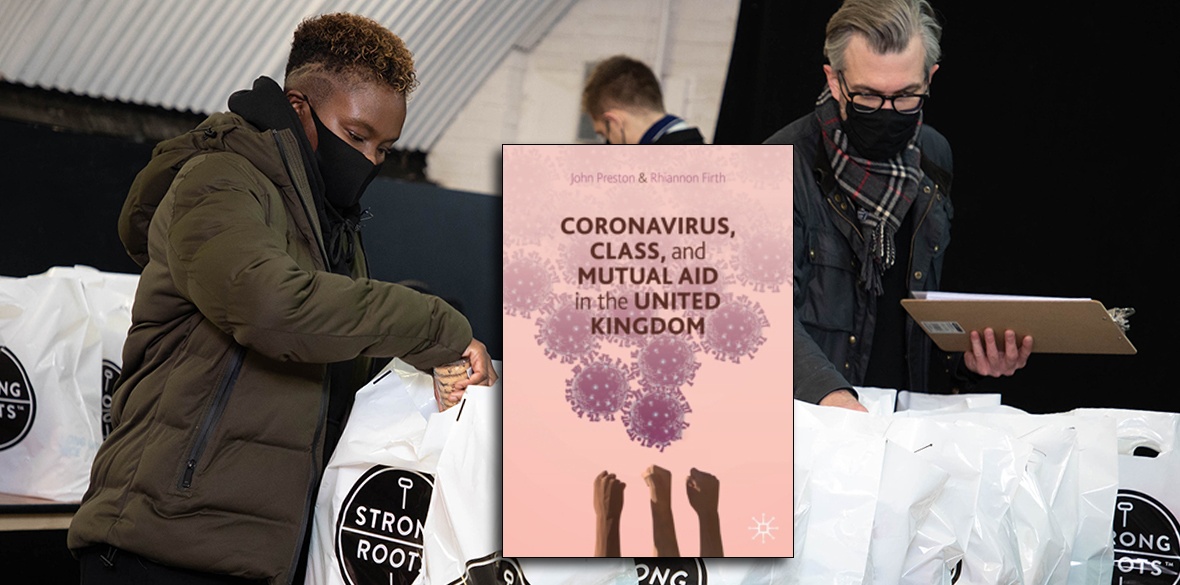This is the last article you can read this month
You can read more article this month
You can read more articles this month
Sorry your limit is up for this month
Reset on:
Please help support the Morning Star by subscribing here
What are the main messages you want to convey in the book?
JP: Although there’s lots of discourse about a major change in society, coronavirus doesn’t in reality change very much. We weren’t living in a “normal” situation before 2020, we were living in a crisis caused by capitalism.
What we’ve seen in the pandemic is what we call “viral immiseration” — an intensification of profit and exploitation, rather than a break from it.
RF: Before the pandemic the state used to act as an organiser and stabiliser for capitalism but that function is retreating, pushing more people into precarity.
It’s this forced precarity, rather than Covid itself, which makes mutual aid even more essential for people who are delinked from the system.
We’re going to see a lot more mutual aid in the future because without the stabilising function of the welfare state people need to help each other and so they do.
Mutual aid has radical potential, if it were to expand then it could be a transformational force, but it is frequently co-opted by the state. There is a real danger that an “apolitical” and deradicalised idea of mutual aid merely papers over the gaps of the crisis but doesn’t really change anything.
Is there a conflict here between pro and anti-state left?
JP: There has been a mistaken distinction made between the left who apparently want a strong lockdown and the right libertarians who don’t — but this just corrals people on the left into a pro-lockdown position.
RF: The important point here is the false conflation of authoritarian lockdown with public health and safety. Anarchist theory offers the possibility that people will look after each other and take health precautions of their own accord. In fact, they are likely to be more invested in this if it comes from the grassroots, rather than being imposed from above.
How do people practising mutual aid resist being shut down by local authorities on the basis of privacy?
JP: It’s really hard to do anything that isn’t immediately commodified by either the state or capital. For example the BLM movement, or environmentalism, is where we see an almost complete commodification by business. You see appropriation by the state.
By taking part in mutual aid, people are transgressing that — realising that not being exploited and doing things communally is better than what the alternatives might be. You don’t necessarily need a theorist saying “what you’re doing here is actually in this or that book,” people are already learning these new ideas themselves.
How do you enable these mutual aid groups to flourish and have a legacy?
RF: In some groups with political organisers, there was really effective action, beyond helping with food to other things like resisting eviction and rent strikes.
JP: They could become communes, co-operatives — forms of communism. It indicates potential for a new way of understanding how communism is achieved, there are many roads to communism.
RF: People have to be invested in the process of creating these structures from the beginning. Mutual aid is an activity that allows people to take away the state’s monopoly on protection and protect themselves. All the radical activity we can get on this front is good because it does raise people’s consciousness.
JP: We are used to thinking of capitalism as a totally dominating power, but actually there is a huge amount of resistance going on everywhere. While we don’t often notice it, parts of communism are happening in the here and now and mutual aid is an example of that.
You say that Covid hasn’t really changed anything but are there any lessons to be drawn from it?
RF: Covid has intensified exploitation and technological development in favour of capitalism. The pandemic has shown how mutual aid will be recuperated by the state and capital very easily unless it is actively defended.
JP: If we are not careful then the positive things that can be taken from Covid and mutual aid will be taken to be a property of capital, rather than of the people who actually did these things.
We should hold onto the understandings that labour — such as that of food and care workers — on whom everyone depends, is actually fundamental. That was something that Covid made people realise, as well as changing people’s ideas about the potential of mutual aid.
If people decide to protect and look after each other then there’s little the state can do.
Coronavirus, Class and Mutual Aid in the United Kingdom is published by Palgrave Macmillan, £19.19.











